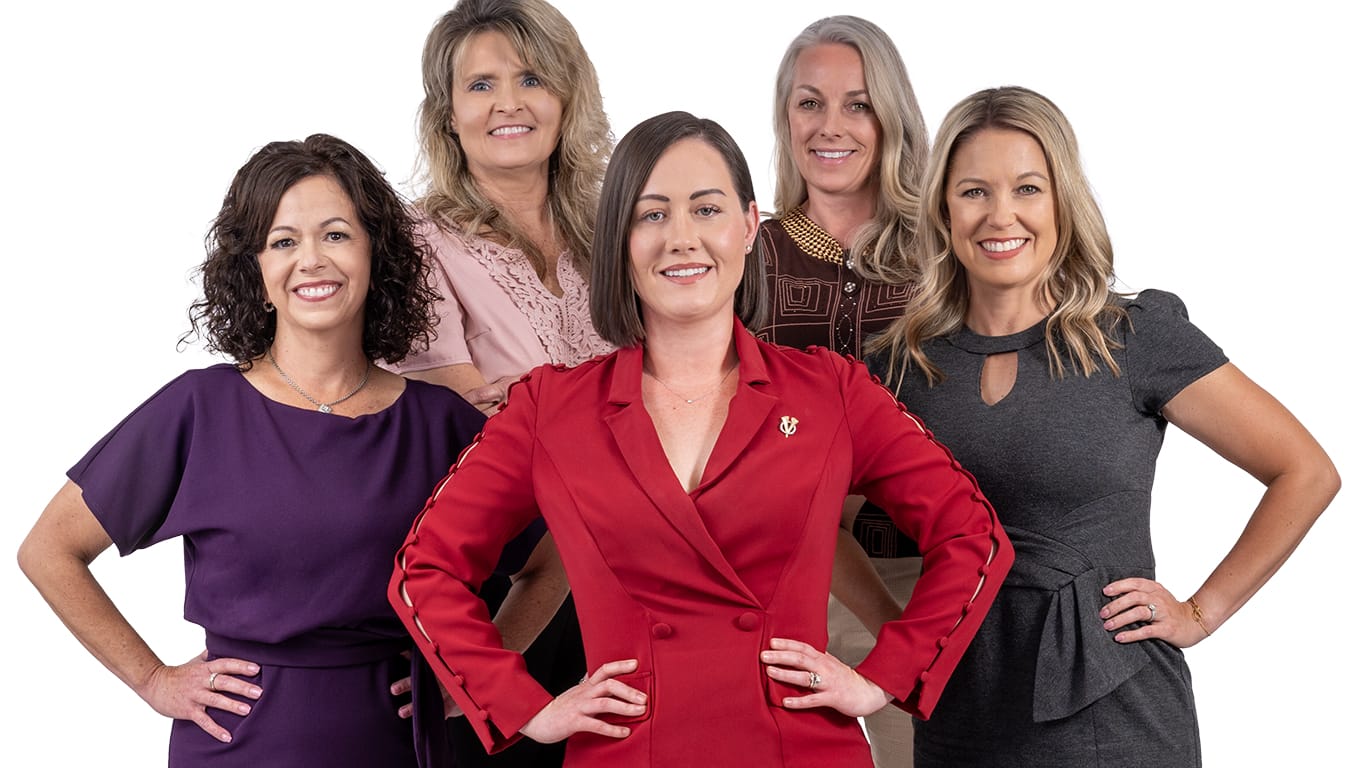The late Ruth Bader Ginsburg once said, “Women belong in all places where decisions are being made. It shouldn’t be that women are the exception.” In the commercial real estate world, where plenty of decisions are made, women — statistically — are still the exception. In 2020, CREW Network’s “Benchmark Study: Gender and Diversity in Commercial Real Estate” revealed that women occupy 36.7% of the jobs in the commercial real estate industry. This percentage, according to the study, has not changed much over the last 15 years.
Sadly, the statistics of women holding executive leadership positions in commercial real estate are even less inspiring. The same CREW benchmark report revealed that women hold a mere 9% of C-suite positions within the commercial real estate industry.
There may still be a rough and uphill road to the C-suite for women in commercial real estate, but established and emerging commercial real estate leaders in Arizona are using their voices and AZCREW as a platform to effect change, encourage one another, inspire new generations of women in commercial real estate and taking women in the industry from being the exception to the rule.
The easier, softer way?
In 12-step recovery, there is a saying used to describe the alternative to working hard toward one’s recovery; this is referred to as the “easier, softer way.” Many women in commercial real estate have expressed the notion that to strive toward leadership — whether in the C-suite or forward momentum in their career — the easier, softer way simply isn’t an option.
This is a lesson Jenny Liles, director of market operations for Cresa and AZCREW board president, faced at a inflection point in her commercial real estate career; a time when she considered exiting a difficult situation.
Opting for a brokerage team or a less prominent role could have offered me an easy escape, allowing me to fade into the commercial real estate background. This path would have spared me considerable emotional and time investment. However, I decided to pause, reflect deeply on my feelings, and make a deliberate choice that aligned with my personal and professional goals.”
Heather Skinner, director of real estate for The US Oncology Network at McKesson, faced a similar moment in her career. “I was sad for everybody else who had experienced similar or worse things than I had,” she says, “and I said to myself in that moment, ‘My purpose
is to make sure that it’s easier for the next person. I am going to fight, not only for me, but for every other woman in this industry for the rest of my days”
For others, such as Monica May-Dunn, CEO and CFO for Arizona Escrow & Financial Corporation and a woman who has been at the same company for close to 34 years, the road may not have been as bumpy, but the emphasis of needing to remain stalwart is still seeped throughout her story.
“There are always challenges on a daily basis as a leader,” May-Dunn explains, “and there’s always going to be issues. The biggest challenge I faced was during COVID in 2020, not knowing whether I wanted to go through with buying the company. It was very nerve-wracking for me and my family.”
Types of challenges
For these women of AZCREW and others, the challenges that abound within commercial real estate are often similar. Some of the greatest points of adversity for women in commercial real estate centers on salary discrepancy compared with their male counterparts. According to CREW Network, “The average fixed base salary in commercial real estate in 2020 was $112,290 for men and $100,802 for women. The 10.2% salary gap means that, on average, women make 90 cents for every dollar that men earn in fixed salaries.” It was also noted that these salary differentials were compounded for women and people of color.
Inequities in pay and executive leadership presence aren’t the only common challenges by women in commercial real estate. CREW’s benchmark study starkly revealed that women’s career satisfaction and perceptions of success decreased across all industry specializations in 2020. For some, this dissatisfaction resulted from a sense of either feeling like a lone wolf and/or having to continuously prove their worth to peers.
“One of the biggest challenges faced on my way to the C-suite has been feeling supported,” says Lynette Dreitz Fort, principal and chief financial officer for Cawley Architects. “Whether it’s because I’m a woman or whatever it is, there are times I just haven’t felt supported in my positions.”
Early in her career, Liles recalls instances in which she felt she was not taken seriously. “My biggest hurdle was dealing with hearing things like, ‘You don’t know how to lease these buildings,’ or ‘You don’t know how to run a TI project,’” she says.
For other women in commercial real estate, flexibility poses one of the greatest challenges. Although CREW Network has reported that a flexible work schedule remains a priority for women in commercial real estate, “94% of CREW survey respondents said they believe requesting more flexible working arrangements would negatively affect their chances of a promotion.”
“Early in my career, I walked away from an opportunity with a firm I thought I really wanted to work for but would not offer the flexibility of work hours,” says Tammy Carr, director of business development for Brinkmann Constructors, “and my first son was a toddler and my position [at the time] meant I frequently worked later.”
What does it mean to have a thick skin?
It’s not completely unheard of for women in commercial real estate, especially those who’ve carved a place for themselves in leadership, to develop a thick skin. But this oft-assumed “outer shell of strength” looks and feels the same for everyone.
“There can be a delicate balance between being assertive and being perceived as overbearing,” Dreitz Fort says.
Stephanie Handley, vice president of economic development for Clayco, adds: “I think women who are described as having ‘thick skin’ can be thought of as abrasive, uncaring and unkind. If they show assertiveness, that can be mistaken for being bossy or difficult, when they may just be standing up for what they believe in.”
Liles offers another perspective of what it means to have a thick skin as a woman in commercial real estate: “I don’t think thick skin means ‘Now I’m
going to be tough.’ I do think, however, it requires realizing, “You’re always going to have conflict and you can’t avoid it.”
For Skinner, rather than thinking of career challenges that she’s faced as leading to developing a thick skin, she considers it more about developing a keener sense of perspective. “I think perspective has allowed me to take things less personally. I’ll look at it more as ‘This is the way it is — love it or leave it,’” she says. “I can be mad and bitter and fight about it, or I can find a better way to accomplish the change we need, which is to be present and
to stand for what’s right and to help others do the same thing.”
Carr has a similar view, adding, “If you show up curious, graciously receive feedback, implement improvements as they make sense, then you will be seen as someone who not only handles feedback, but thrives from it,” she says. “You want to be in a constant state of listening, learning, improving and seeking to understand perspectives that vary from yours.”
Advice for next generations
The women who have navigated numerous obstacles, celebrated just as many victories and continue to strive to be the best leaders in their field are united in their efforts to share their experiences and offer hope and support to new generations of women in commercial real estate.
“This industry requires immense and continuous determination to deal with market conditions, supply chain challenges, workforce, controlled growth or mindful retraction, company and team culture, competitiveness and market share, public policy and community challenges,” Carr says. “Once you think you’ve figured out one piece of the puzzle, you begin searching for the next solution and undoubtedly they are intertwined. I’ve learned the importance of self-awareness, self-management and self-care over the years.”
In her road to becoming a leader, May-Dunn discovered that it’s not mandatory to know all things, at all times, for all people.
“If you don’t know something, this is what I’ve learned: If someone asks me something, I’m not going to act like I know the answer. If I don’t know the answer, I will say ‘I don’t know the answer, but let me find out,’” she says.
To the same tune of not having all the answers, Skinner offers this: “Innovate, be curious. Don’t just accept that this is the way that it has always been done.”
In closing, one vital takeaway that the women of AZCREW all agree is to find your tribe.
Liles adds “having the right people in your corner, people you can confide in, and people who tell you like it is – that’s everything. I’ve found this support through AZCREW and that’s instrumental to my success.”
Dreitz Fort offers this last snippet of inspiration to emerging commercial real estate leaders: “As women, we have the power to lift each other, to be each other’s cheerleaders. Our journeys are as diverse as the colors of a rainbow, but our shared determination unites us. Let’s celebrate our uniqueness and overcome every challenge with grace and resilience. Authenticity is our superpower. Embrace it and let your light shine.”




